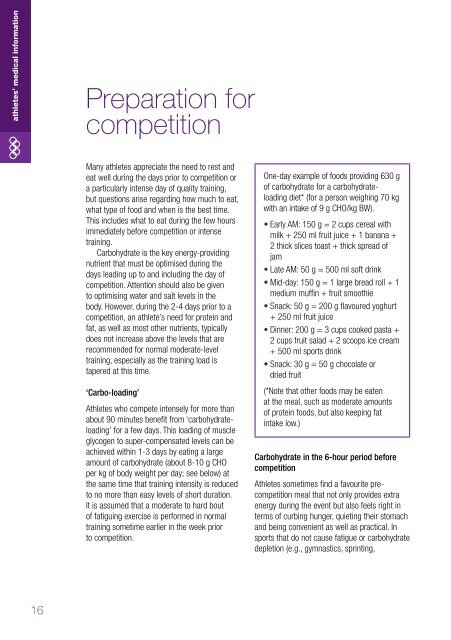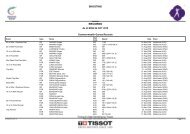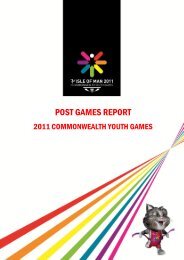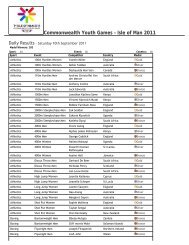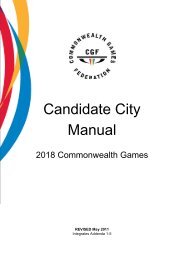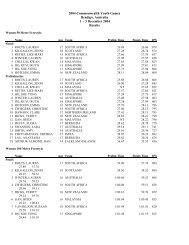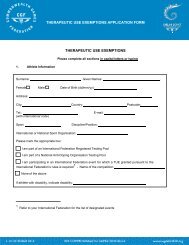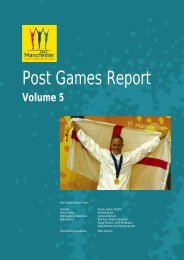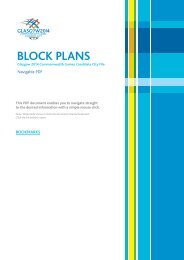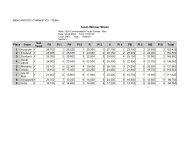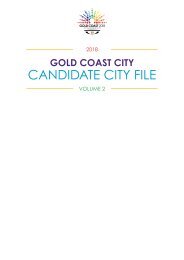Nutrition for Athletes - Commonwealth Games Federation
Nutrition for Athletes - Commonwealth Games Federation
Nutrition for Athletes - Commonwealth Games Federation
Create successful ePaper yourself
Turn your PDF publications into a flip-book with our unique Google optimized e-Paper software.
athletes’ medical in<strong>for</strong>mationPreparation <strong>for</strong>competitionMany athletes appreciate the need to rest andeat well during the days prior to competition ora particularly intense day of quality training,but questions arise regarding how much to eat,what type of food and when is the best time.This includes what to eat during the few hoursimmediately be<strong>for</strong>e competition or intensetraining.Carbohydrate is the key energy-providingnutrient that must be optimised during thedays leading up to and including the day ofcompetition. Attention should also be givento optimising water and salt levels in thebody. However, during the 2-4 days prior to acompetition, an athlete’s need <strong>for</strong> protein andfat, as well as most other nutrients, typicallydoes not increase above the levels that arerecommended <strong>for</strong> normal moderate-leveltraining, especially as the training load istapered at this time.‘Carbo-loading’<strong>Athletes</strong> who compete intensely <strong>for</strong> more thanabout 90 minutes benefit from ‘carbohydrateloading’<strong>for</strong> a few days. This loading of muscleglycogen to super-compensated levels can beachieved within 1-3 days by eating a largeamount of carbohydrate (about 8-10 g CHOper kg of body weight per day; see below) atthe same time that training intensity is reducedto no more than easy levels of short duration.It is assumed that a moderate to hard boutof fatiguing exercise is per<strong>for</strong>med in normaltraining sometime earlier in the week priorto competition.One-day example of foods providing 630 gof carbohydrate <strong>for</strong> a carbohydrateloadingdiet* (<strong>for</strong> a person weighing 70 kgwith an intake of 9 g CHO/kg BW).• Early AM: 150 g = 2 cups cereal withmilk + 250 ml fruit juice + 1 banana +2 thick slices toast + thick spread ofjam• Late AM: 50 g = 500 ml soft drink• Mid-day: 150 g = 1 large bread roll + 1medium muffin + fruit smoothie• Snack: 50 g = 200 g flavoured yoghurt+ 250 ml fruit juice• Dinner: 200 g = 3 cups cooked pasta +2 cups fruit salad + 2 scoops ice cream+ 500 ml sports drink• Snack: 30 g = 50 g chocolate ordried fruit(*Note that other foods may be eatenat the meal, such as moderate amountsof protein foods, but also keeping fatintake low.)Carbohydrate in the 6-hour period be<strong>for</strong>ecompetition<strong>Athletes</strong> sometimes find a favourite precompetitionmeal that not only provides extraenergy during the event but also feels right interms of curbing hunger, quieting their stomachand being convenient as well as practical. Insports that do not cause fatigue or carbohydratedepletion (e.g., gymnastics, sprinting,16


